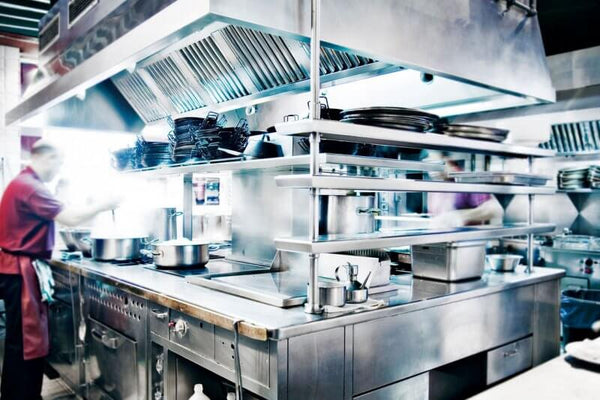What You Should Expect When You Rent A Commercial Kitchen

Renting a commercial kitchen can be a great option for food truck owners and independent chefs. There are a lot of rules and regulations when preparing food, but the main thing that makes a kitchen "commercial" is an official license. Essentially, the government needs to approve your kitchen for cleanliness and safety. Once a kitchen meets these legal standards and obtains a commercial license, chefs can start using the space to cook and serve food to paying customers. That's the beauty of renting a commercial kitchen vs. cooking at home — there are less legal hoops to jump through and it's easy to scale up food production. In this deep dive, we've shared an overview of renting a commercial kitchen, including the various kitchen types, what equipment to expect, and what to bring with you. We've also provided some tips for finding a quality kitchen in your area, and whether you'll need insurance to run your foodservice business there.
Different Types of Commercial Kitchens For Your Needs
Before searching for a commercial kitchen in your city, consider how much space you'll need to be profitable, and how much money you currently have to spend on the rental. Here are a few of the most popular rental arrangements:- Commercial Kitchen/Commissary: Designed for food prep and storage, these facilities are licensed and ready to use. Bakers, food truck purveyors, and other independent chefs rely on commercial kitchens to ramp up production. Sometimes, a city will have regulations against cooking in a food truck, so a chef can prep food in a licensed kitchen and then serve it on the road. We highly recommend learning your local city and county health regulations for foodservice businesses before renting a kitchen.
- "Shared Space" Kitchen: These commercial kitchens are designed for group use. Typically, you sign up for a time slot in advance, so the kitchen is constantly being used by different foodservice businesses. In some cases, an existing brick-and-mortar restaurant will rent out their space to another group during off-hours. Many cooking schools, churches, and hotels will allow you to rent out their commercial kitchens as well.
- Private Kitchen: This is the most expensive option for commercial kitchens, but it offers total control. You can use the space 24/7, store food in the kitchen when you're gone, and set up the equipment however you like.
What Is Included?
Before you sign a contract to rent commercial kitchen space, make sure that you know exactly what's included and what's off-limits. Often, a commercial kitchen won't allow you to bring consumer-grade equipment from home (unless it's designed for professional use). Make sure to get the full list of usable equipment beforehand, and find out if there are additional fees to rent certain gear. Likewise, it's one thing for a rental company to say that you can use their equipment, but that doesn't mean it'll be there when you walk into the kitchen. The equipment should be available, and not full of product from another restaurant operation. In most licensed commercial kitchens, you should expect a grill, oven, fridge, and freezer. There should also be ample prep tables and an adequate dishwashing area for the kitchen's size. Every commercial kitchen is different, so you shouldn't assume that anything will be included. Just cover your bases, don't be afraid to ask "dumb" questions, and your rental experience will go smoothly.
What is Provided?
Equipment can vary wildly when renting a kitchen. Some rentals will provide pots, pans, trays, and more, which could save you a lot of prep time. Other commercial kitchens will be barebones and expect you to bring everything. As a renter, you should also find out whether a kitchen has adequate storage facilities, including cold storage, dry storage, and a packing area. Of course, if you're relying on someone else's equipment, you run the risk of it failing during a busy service. If you have access to vital equipment and it's not too much trouble to transport, we recommend bringing your own. It'll save you money and potential headaches.
Things You Need To Bring
At a minimum, chefs will need to bring their own knives and custom equipment to their commercial rental. Hopefully, your temporary kitchen will come fully stocked with everything you need to take care of business. If you're stuck working in a barebones space and need to bring equipment, you can rent it from another company or buy it refurbished. Often, refurbished gear will be in Like New condition, at a fraction of the cost. Most resellers will offer a warranty, so you can usually buy refurbished without worrying about a lemon.
Do You Need Additional Insurance?
During the application process to rent commercial kitchen space, you'll be asked to submit a few documents that validate your foodservice business. This usually includes a food handler's certificate, a general business license (unless you're renting the kitchen for non-commercial use), and a copy of your liability insurance. Most kitchens will require you to be insured for $1,000,000 or more.




















